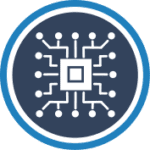The Computing curriculum at Bluecoat Wollaton enables students to develop skills and knowledge in Computer Science and Digital Media, preparing them for a future in a world fully immersed in the use of computer technology. Students will have tenacity when using computers, so that they can solve problems independently and learn from their mistakes. Whether they want to learn the science behind computers and be able to write algorithms and develop programs, or to design and produce creative digital content for users to see, we have designed a curriculum which goes far deeper than the interface that’s in front of them.
An important life skill for anyone is to problem solve. We aim to develop our students’ problem-solving skills, in order that they may be able to use computer technology confidently, safely, effectively and efficiently in a range of circumstances. We practice this through programming and computational thinking, using real life problems and expressing these as algorithms using logic and reasoning. Computational thinking is essential to the development of computer applications, but more so is a vital skill to support problem solving across all disciplines. It will not only aid learners with their Computing journey but is also embedded within their everyday life. Our learners will tackle of range of real-world challenges developing other skills such as resilience and tenacity.
The curriculum covers the following key areas which are revisited strategically, building up knowledge as students become experts in each area:
Digital Literacy
To ensure that our students understand how to use computers in an appropriate way. We ensure that students can use IT safely, responsibly, and legally. Furthermore, we use a wide range of different software and platforms to prepare our students for a future using different technology and systems.
Computer Science
Students will learn how computers function, for example how data is stored and processed. This includes learning about Binary numbers, and the different hardware used to interact with computers.
Computational thinking
We provide students with the skills to analyse, design, and develop a solution to a problem. We develop programming skills each year by building layers of understanding; for example, in Year 7 students use flowchart software to write simple algorithms, in Year 8 they use block-based software to develop more complex programs, which leads onto full text-based programming using Python.
By the end of their journey, students will be equipped with a strong core of knowledge to engage with computer technology in their future careers.
OCR GCSE Computer Science (J277)
Computer Science is both engaging and practical, encouraging creativity and problem solving. It encourages you to develop your understanding and application of the core concepts in computer science. You will also analyse problems in computational terms and devise creative solutions by designing, writing, testing and evaluating programs.
OCR’s GCSE (9–1) in Computer Science consists of two compulsory components that are externally assessed.
Component 01: Computer systems
Introduces you to the central processing unit (CPU), computer memory and storage, data representation, wired and wireless networks, network topologies, system security and system software. It also looks at ethical, legal, cultural and environmental concerns associated with computer science.
- This is a compulsory component.
- It is worth 80 marks, representing 50% of the total marks for the GCSE (9–1).
- This component is an externally assessed written examination testing AO1 and AO2.
- The examination lasts 1 hour 30 minutes.
- All the questions are mandatory.
- The question paper will consist of short and medium answer questions. There will also be one 8-mark extended response question. This question will enable students to demonstrate the ability to construct and develop a sustained line of reasoning.
Component 02: Computational thinking, algorithms and programming
You apply knowledge and understanding gained in component 01. You will develop skills and understanding in computational thinking: algorithms, programming techniques, producing robust programs, computational logic and translators.
- This is a compulsory component.
- It is worth 80 marks, representing 50% of the total marks for the GCSE (9–1).
- This component is an externally assessed written examination testing AO1, AO2 and AO3.
- The examination lasts 1 hour 30 minutes and is formed of two sections.
- All the questions are mandatory.
- Section A is worth 50 marks, and assesses students’ knowledge and understanding of concepts of Computer Science. Students then apply these to problems in computational terms, where they may use an algorithmic approach.
- Section B is worth 30 marks, and assesses students’ Practical Programming skills and their ability to design, write, test and refine programs.
- The question paper will consist of short and medium answer questions.

Careers Links
Studying Computer Science can help develop transferable skills that can be applied to a vast range of different career paths. Click here for examples of some of the employability skills Computer Science can provide.
- Where can Computer Science take you?
- Careers using Computer Science
- This Is Engineering
- Engineers at Work
- Discover IT careers in the NHS
- How to become a coder: Pauline's story
- How to become an app developer: Jack's story
- What is it like to be an ethical hacker?
- Using computer science in other disciplines
- National Careers Service: Careers in computing, technology and digital
- All About Careers: IT & Technology
- Prospects: information technology
- Women in Tech
- MYPATH: JOB OF THE WEEK - EPISODE #07 - GAMES TESTER
- MYPATH: JOB OF THE WEEK - EPISODE #09 - IT TECHNICIAN

